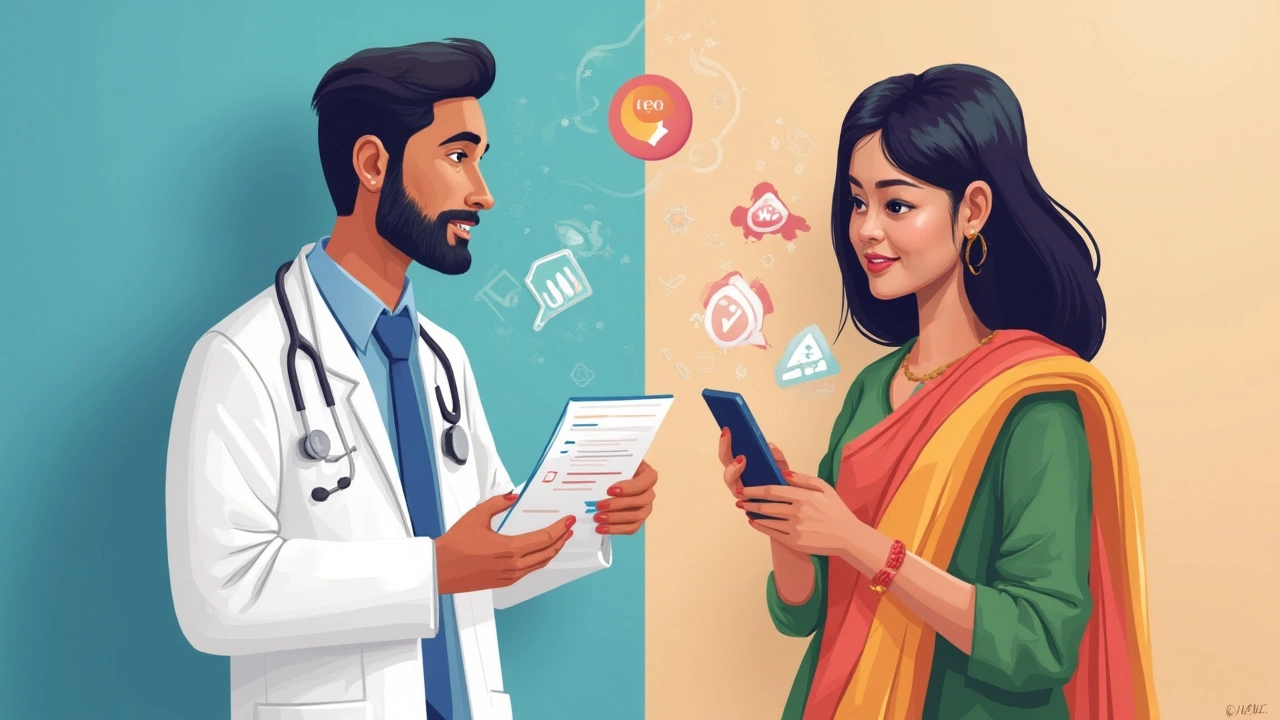
Ordering prescription meds without stepping foot in a doctor's office—sounds tempting, right? The reality is, this is now pretty common with online pharmacies, but there are some catches. The big question is: Can you actually get a legit script without seeing a doctor, or is it some internet myth?
Good news: you might not need to sit in a waiting room for hours anymore. Many online pharmacies use telehealth, letting you chat or fill out a form for a licensed healthcare provider to review. Sometimes it's all about a quick video call, sometimes just an online assessment. Either way, a real doctor needs to check if you actually need that medication. We're talking things like birth control, allergy meds, or ED pills—for stuff like antibiotics or strong painkillers, the rules are way stricter.
Knowing the difference between what's legal and what's just shady is a big deal. Not all sites play by the rules. Getting a script fast shouldn’t mean risking your health, so you’ve got to know what to watch for, and where you might cross a line without realizing.
- Can You Get a Script Without a Doctor Visit?
- How Online Pharmacies and Virtual Consults Work
- Legal Stuff and Safety Risks You Should Know About
- What Medications You Can (and Can't) Get Online
- Tips for Staying Safe When Buying Prescriptions Online
Can You Get a Script Without a Doctor Visit?
This is probably one of the most common questions people have about online pharmacy sites. The quick answer: Yes, you can often get a prescription—but there’s a catch. You still have to interact with a licensed healthcare provider. These days, that often means filling out an online medical form or having a quick video call. So, you’re not completely skipping the doctor, but you’re definitely skipping the old routine of making an appointment, sitting in a waiting room, and missing half a day of work.
Here’s how it works at most legit telehealth or online pharmacy sites:
- You go to their website and create an account.
- You fill out a health history or symptom checklist.
- A licensed doctor or nurse practitioner reviews your info, sometimes asking follow-up questions or booking a video chat if needed.
- If you qualify for the medication, they send a digital script to the online pharmacy.
- Your meds are shipped to your door, sometimes within days.
It’s not just for cough syrup or allergy meds, either. Americans are using these sites more than ever—according to a 2023 study by JAMA Network Open, over 42% of adults under 40 have tried a telehealth pharmacy at least once since the pandemic.
There are limits. Medications like strong painkillers, ADHD meds, or anything with high abuse risk almost always need an in-person visit or, at the very least, a live telehealth consultation. Federal rules in the U.S. (especially the Ryan Haight Act) make sure that certain prescriptions can’t be handed out after just an online form.
Here’s a quick breakdown:
| Type of Med | Quick Online Script? | Extra Steps? |
|---|---|---|
| Birth Control, ED meds, Acne treatment | Usually | Online form and review |
| Antibiotics | Sometimes | Online assessment + maybe video |
| Painkillers, ADHD meds | Rarely | Usually needs in-person check |
Bottom line: While the process is faster, you’re not sidestepping doctors completely. You’re just connecting with them through your phone or laptop instead of a waiting room chair. Always make sure the site uses real medical professionals and follows your country’s laws about prescribing meds online.
How Online Pharmacies and Virtual Consults Work
So, how do these online pharmacy services actually pull off getting you a prescription without the classic doctor’s office visit? The answer is tech and telehealth. It’s more common than ever, especially since the pandemic fast-tracked video health appointments for everything from minor infections to common meds.
Here’s the typical process most legit online pharmacy sites use:
- You land on their website and create an account. Most want your basic details, medical history, and any current meds you’re taking.
- Next comes a health questionnaire or an online assessment. You’ll answer detailed questions about your symptoms, allergies, and general health.
- Sometimes, you’ll have a quick chat with a real doctor or nurse through a video call or secure chat. Often, it’s scheduled, but some sites are on-demand, sort of like ordering food delivery.
- A licensed provider (yep, a real one) reviews your info. If they think you really need the medication, they write a digital script.
- The script goes straight to the pharmacy, which ships the meds right to your door. If they say no, usually you get a reason why.
It pays to know that most reputable platforms work with actual U.S. or local licensed healthcare providers. According to the CDC, around 37% of adult patients used telehealth in just one year during the pandemic boom. That’s a huge shift, and online pharmacy services piggybacked right onto this trend.
| Step | What Happens |
|---|---|
| Sign Up | Create an account, enter details |
| Health Assessment | Fill in honest medical info and answer questions |
| Virtual Consult | Talk with a provider (video or chat) |
| Prescription Decision | Provider reviews and decides if a script is safe |
| Home Delivery | Pharmacy ships meds, often with tracking |
It’s easy to see how fast and convenient this is, but it depends on picking a legit site. The FDA says,
"Only use online pharmacies that require a valid prescription from a healthcare provider and are licensed by your state board of pharmacy."Don’t skip that step—if they don’t ask for any info at all, that’s a red flag, not a shortcut.
The bottom line: Telehealth and online pharmacies make life easier, but the safe ones will always involve a real medical review before you get a prescription.

Legal Stuff and Safety Risks You Should Know About
This is where people can get tripped up: not all online pharmacy sites follow the law. In the U.S., to legally get a prescription medicine, you need one written by a real, licensed doctor. Even if your "appointment" is just an online questionnaire or chat, a real professional must be involved. If a site promises to ship meds with zero questions asked or skips the doc altogether, it's probably breaking the law—and putting your health at risk.
Here's the tricky part: fake pharmacies often look legit. The FDA says about 97% of online pharmacies don't follow U.S. rules. That’s a wild number when you think about it. Why does this matter to you? Well, fake sites may send you the wrong meds, less-active ingredients, or straight-up dangerous stuff. You could end up with something that looks right on the outside but does nothing (or worse), especially with stuff like ED meds, antibiotics, or anything for chronic illness.
If you're thinking about using an online pharmacy, always check for these:
- Is the pharmacy licensed in the U.S.? (Check state boards of pharmacy websites—they list real ones.)
- Does it ask for a valid prescription or have a proper telehealth process?
- Can you talk to a licensed pharmacist if you have questions?
- Is there clear contact info and a street address, not just an email form?
Some sites try to get around these steps by operating overseas. U.S. law doesn’t allow you to import most prescription meds from other countries, even if they’re "cheaper." Customs might seize your shipment, and you won’t be protected if it’s the wrong stuff.
Here's a quick reference table that might help you spot a legit operation:
| What to Check | Red Flag | Green Flag |
|---|---|---|
| Requires Prescription | None needed | Mandatory |
| Pharmacy License | Can't verify | Listed/verified |
| Pharmacist Access | Not available | Easy to reach |
| Contact Info | Email only, no address | Clear U.S. address & phone |
Bottom line—use common sense. If regular doctors wouldn't hand you a medicine without checking you out, why would a website?
What Medications You Can (and Can't) Get Online
Not every medication is fair game when it comes to online pharmacy orders. There are strict rules to keep folks safe, and knowing what's possible saves you a ton of hassle (and possibly your health).
First, here’s some good news: a lot of common meds are available online with a virtual consult. Think:
- Birth control pills and patches
- Allergy meds like Claritin or Zyrtec (and some with a script, like Singulair)
- ED drugs such as Viagra and Cialis (with proper evaluation)
- Certain acne treatments
- Medicines for hair loss (like finasteride)
- Some mental health meds (for things like mild anxiety or depression, but this varies a lot between states and providers)
For anything riskier—like antibiotics, ADHD meds, or painkillers—most legit online pharmacy services have tighter controls. Here’s the catch: meds that fall under “controlled substances” are almost never available by online script alone. The DEA keeps a close watch on those. So, if you see a site offering Adderall, opioid pain meds, or strong sleep aids with no questions asked, that’s a giant red flag.
Here’s a quick comparison:
| Type of Medication | Can You Get It Online? | Extra Steps or Restrictions? |
|---|---|---|
| Birth Control | Yes | Usually after a short online assessment |
| Antibiotics | Sometimes | Must have a clear diagnosis, restrictions apply |
| Opioid Painkillers | No | Not legally through online-only consults |
| Mental Health Meds (SSRIs, etc.) | Sometimes | Depends on provider, state rules |
| ED Meds | Yes | After online/virtual consult |
| ADHD Meds | No | Controlled, need in-person evaluation |
Something to note: telehealth and telehealth laws keep shifting. During COVID-19, a lot more drugs could be prescribed online, but rules are now tightening up again as of 2024. Always check your state’s requirements before hitting “order.”
Stick to well-known online pharmacy services that require real ID and prescriptions—it’s the best way to avoid fake meds or shady offers. If a website promises pretty much any medication without even asking health questions, that’s a warning sign you shouldn’t ignore.

Tips for Staying Safe When Buying Prescriptions Online
Ordering meds from an online pharmacy can be super convenient, but it's easy to get caught by sketchy sites. Here’s how to make sure you don’t end up with fake meds or put your info at risk.
- Check for a real pharmacy license: Any legit online pharmacy should show proof they’re licensed in your country or state. Look for seals from organizations like the NABP (National Association of Boards of Pharmacy) or government health sites. No license? Move on.
- Look for a prescription requirement: If a site offers prescription drugs without asking for a prescription or online health assessment, it’s a big red flag. Legal prescription meds in the U.S. always need doctor approval—even online.
- Watch for contact info: Trustworthy sites always have real addresses and certified phone numbers. Avoid any pharmacy that doesn't list how you can reach them in case something goes wrong with your medication.
- Read reviews and do a quick search: Do a fast web check. Search the pharmacy name plus “scam” or “review.” If people had bad experiences or didn’t get what they paid for, you’ll find warnings fast.
- Compare prices, but don’t fall for deals that are too good: Everyone wants to save cash, but prices that are way lower than other sites or your local pharmacy are usually a sign something’s not right. Counterfeit meds are a real problem.
- Keep your own info private: Never enter your credit card or health details on a site that isn’t secure. The address bar should always start with “https” and show a little lock symbol.
In case you want to see how real vs. fake pharmacies stack up, here’s what research in the U.S. found about these sites:
| Type of Online Pharmacy | Meets Safety Standards |
|---|---|
| Verified by NABP | 91% |
| Not Verified | 5% |
| No License Info Shown | 2% |
If you’re ever unsure, use pharmacy checkers like the NABP website or LegitScript. They keep updated lists of approved online pharmacy sites, so you can double check before spending money—or risking your health.





Rohan Talvani
I am a manufacturing expert with over 15 years of experience in streamlining production processes and enhancing operational efficiency. My work often takes me into the technical nitty-gritty of production, but I have a keen interest in writing about medicine in India—an intersection of tradition and modern practices that captivates me. I strive to incorporate innovative approaches in everything I do, whether in my professional role or as an author. My passion for writing about health topics stems from a strong belief in knowledge sharing and its potential to bring about positive changes.
view all postsWrite a comment